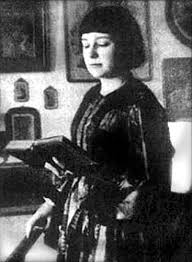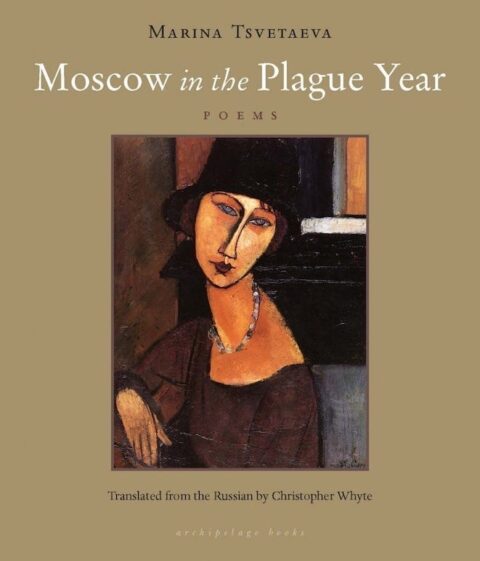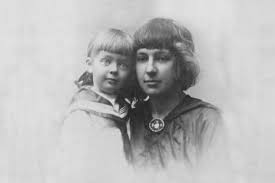Marina Tsvetaeva (1892-1941) published her first book of poems, Evening Album, at age 18 in 1910. Although her second book, Mileposts, appeared in 1921, it did not include most of the poems written in the interim, “arguably the most productive [years] of her entire career” according to her latest translator, Christopher Whyte. Moscow in the Plague Year collects 178 of these pieces: short lyrical poems, sequences, and epigrams. Many of them have never been rendered in English.
 Her productivity during that decade is all the more startling in light of the conditions she faced. When the Bolshevik coup erupted in Petrograd on October 24, 1917, Tsvetaeva was in the Crimea. Aloof from politics by temperament, she rushed to Moscow where her husband, Sergey Efron, was fighting in the streets against the uprising. He soon departed with the counter-revolutionary forces. Tsvetaeva had grown up with the advantages of middle-class life, but now she and her two young daughters found themselves in an impoverished city with little money, food or fuel.
Her productivity during that decade is all the more startling in light of the conditions she faced. When the Bolshevik coup erupted in Petrograd on October 24, 1917, Tsvetaeva was in the Crimea. Aloof from politics by temperament, she rushed to Moscow where her husband, Sergey Efron, was fighting in the streets against the uprising. He soon departed with the counter-revolutionary forces. Tsvetaeva had grown up with the advantages of middle-class life, but now she and her two young daughters found themselves in an impoverished city with little money, food or fuel.
Viktoria Schweitzer, a Tsvetaeva biographer, notes that the poet believed the Revolution “had brought to the surface all that was bad and dark in people’s souls, that the specious Bolshevik slogans concealed lies and brutality and had as great an effect on Tsvetaeva as the sensations of hunger, cold and fear.” This is the world she addresses in the first part of “In Memoriam A.A. Stakhovich”:
It wasn’t bakeries being shut with seven
locks, or ice coating the stoves, that sent
you, nobleman of Russia, to your grave
with perfect posture and a lordly step!
Fate took its course. The old world was ablaze.
It fell to courtiers to cut wood. The mob
Had its heyday … In your vicinity
One could still breathe the eighteenth century.
The mob tore off the roofs from palaces
To get its hands on what it longed for, while
Amidst general devastation, you
Taught young men maintien, tenue, and bon ton
Her response to events did not please Osip Mandelstam with whom she had been intimate in 1916. He indicted her poems for “bad taste and historical falsity,” preferring poetry that offered philosophical explanations for Russia’s civil war. (Tsvetaeva’s essay “Poets With History and Poets Without History” proves that her historical thinking was as acute as Mandelstam’s.) But Whyte points out that while Tsvetaeva portrayed the harshness of Moscow life in her verse, she was guided by “moments of utter, piercing happiness,” a wild and brave insistence on regarding things on her own terms. He quotes her notebook:
 Deprivation can seem infinitely cozy, a sort of dream. These days I live exactly as I choose: one poem – an attic! – the sky close by, together with the children, Irina’s toys, Alya’s books – the samovar, the axe, the basket of potatoes – these are the main actors in life’s play! My books, my jotters, a puddle from the leaking roof or a sunbeam spreading through the room – this is beyond time, it could be any time or any place – the eternal things are present: mother and children, poet and attic.
Deprivation can seem infinitely cozy, a sort of dream. These days I live exactly as I choose: one poem – an attic! – the sky close by, together with the children, Irina’s toys, Alya’s books – the samovar, the axe, the basket of potatoes – these are the main actors in life’s play! My books, my jotters, a puddle from the leaking roof or a sunbeam spreading through the room – this is beyond time, it could be any time or any place – the eternal things are present: mother and children, poet and attic.
She also wrote, “In the year 1919 people are surprised by nothing: the right time for me to be alive … I adore the year 1919 because I play at it.” This is the implied if not overriding sentiment in most of the plague poems. As Whyte says, “She succeeded, so to speak, in contemplating life in the plague year through the wrong end of the telescope, in uncovering its emblematic, exemplary quality.” She “played” at creating or perceiving an aura within the despair. Also, she was writing plays and watching them being produced. You can hear the exuberance in the twenty-third part of “Playacting” (below):
Though it’s unique, the sun parades through every city.
The sun belongs to me. I’m not going to relinquish
An hour, a beam, a glance to anyone.
Let the cities perish in endless night!
It’s in my hands! Just let it dare keep turning!
No matter if I burn hands, lips, and heart!
Lost in eternal night … I rush off its tracks.
I won’t relinquish you, my sun, to anyone!
 Then in 1920, her daughter Irina died of malnutrition at an orphanage. The years of the plague ended in 1922 with the defeat of the White Army in which Efron served. Three of Tsvetaeva’s volumes were published that year in Russia just as events forced her departure to Berlin where she joined Efron. After living in Prague for three years, she moved to Paris where she remained until 1941 and her fateful return to the Soviet Union.
Then in 1920, her daughter Irina died of malnutrition at an orphanage. The years of the plague ended in 1922 with the defeat of the White Army in which Efron served. Three of Tsvetaeva’s volumes were published that year in Russia just as events forced her departure to Berlin where she joined Efron. After living in Prague for three years, she moved to Paris where she remained until 1941 and her fateful return to the Soviet Union.
During the plague years, her one-and-a-half storey apartment became, as she said, “a shipwreck.” The Communists arrived and pushed her into a single room. Tsvetaeva wrote in her notebook (quoted by Schweitzer), “My hard-hearted friends! If only instead of treating me to pastries at your tea-table you would just give me a little slice of bread for tomorrow morning. But it’s my own fault. I laugh too much when I’m in company. And anyway, when you leave the room I’ll steal your bread.”
In January 1920, she wrote this short lyric:
Born of debauch and separation,
I stretch my hands toward everyone.
Eyelashes fluttering, I tug
the edge of all the young men’s coats.
A voice sounds: Mariula, go!
And I push everyone away.
[Published by Archipelago Books on August 12, 2015. 180 pages, $18.00 paperback]